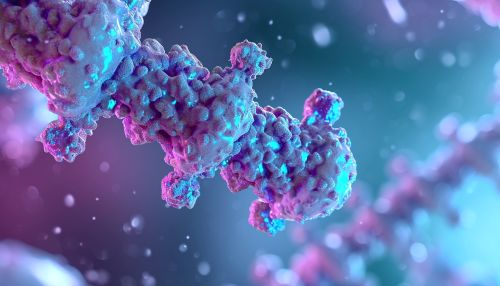Interleukin-10 receptor
Overview
The Interleukin-10 receptor (IL-10R) is a type of protein that is encoded in humans by the IL10RA gene. It is a receptor for interleukin 10 (IL-10), a cytokine involved in the regulation of immune system responses. The IL-10R is expressed on the surface of various immune cells, including T cells, B cells, and macrophages, where it binds to IL-10, initiating a signaling cascade that can suppress inflammatory responses and promote immune tolerance.


Structure and Function
The IL-10R is a member of the class II cytokine receptor family, which is characterized by the presence of two disulfide bonds. It is a heterotetramer, composed of two alpha (IL10RA) and two beta (IL10RB) subunits. The IL10RA subunit is responsible for specific binding to IL-10, while the IL10RB subunit is shared with the receptors for other cytokines, including interleukin 20 and interleukin 22.
Upon binding to IL-10, the IL-10R undergoes a conformational change that leads to the activation of the Janus kinase (JAK) proteins JAK1 and TYK2. These kinases then phosphorylate the signal transducer and activator of transcription (STAT) proteins STAT3 and STAT1, which dimerize and translocate to the cell nucleus, where they regulate the transcription of target genes.
The activation of the IL-10R by IL-10 leads to a variety of immune-regulatory effects. These include the suppression of pro-inflammatory cytokine production, the promotion of B cell survival and proliferation, and the induction of regulatory T cell differentiation.
Clinical Significance
Mutations in the IL10RA and IL10RB genes can lead to a loss of IL-10R function, resulting in a rare, autosomal recessive disorder known as IL-10 receptor deficiency. This condition is characterized by early-onset inflammatory bowel disease, and can also involve other immune-related symptoms, such as arthritis and dermatitis.
The IL-10R is also a potential therapeutic target in various diseases. For example, drugs that enhance IL-10R signaling could potentially be used to treat inflammatory and autoimmune diseases, while drugs that inhibit IL-10R signaling could potentially be used to boost immune responses in the context of cancer or infectious diseases.
Research Directions
Current research on the IL-10R is focused on several areas. These include the development of drugs that can modulate IL-10R signaling, the investigation of the role of the IL-10R in various diseases, and the study of the molecular mechanisms underlying IL-10R signaling.
